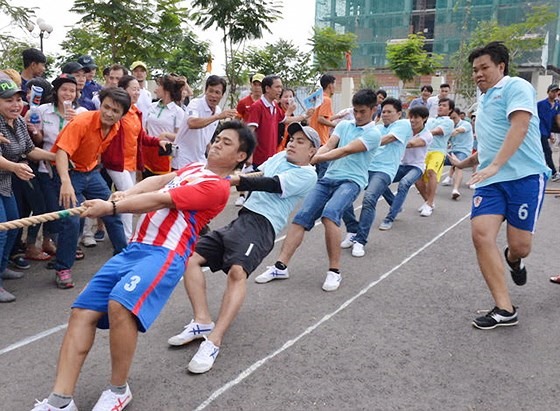 Society
Society

Many workers in HCM City’s industrial parks and economic zones spend most of their “leisure” time taking in more work, seeking to earn extra cash to improve their difficult living and working conditions.
 |
| Workers of HCM City’s industrial zones play tug of war. Many workers in the city’s industrial parks spend their leisure time doing extra work to make ends meet. — Photo sggp.org.vn |
As a result, the social and spiritual lives of these workers remain extremely constrained, leaving them unhappy and at risk of social evils.
Phạm Thị Thanh Hoa, 24, a garment worker from
Hoa said she worked from early morning to midnight to earn VNĐ8 million (US$342) per month. She needs to earn money to send to her elderly parents and 4-year-old daughter back in her hometown.
“I don’t have much time to talk on the phone with my daughter. I’m exhausted after work and only want to sleep”, she said.
An old television, the only valuable item and only source of recreation in her rented room, was covered with a thick layer of dust.
Staying inside a rented room and sleeping is the only leisure activity for most female workers like Hoa.
Nguyễn Thị Thanh Phương, a worker in Thủ Đức District’s Linh Xuân Ward, said she and other roommates usually did nothing but sleep and cook and sleep again on weekends.
Phương said she has spent roughly 15 years working in
“I’ve been stuck on the garment machine all day and don’t even have time for dating,” Phương said.
For male workers, drinking is the most popular recreational activity during weekends.
Nguyễn Tấn Linh, from central
Some beers, boiled eggs and instant noodles with vegetables are good snacks as they get drunk.
Bùi Trần Thành, from
Phạm Thanh Thôi from
They had few chances to get familiar with the city and try to save as much money as possible—except for what they’re willing to spend on alcohol.
Major Lê Hữu Phước, head of the Criminal Police Team of District 8’s Police Department, said cases of drunken workers fighting each other had been reported on weekends and public holidays.
Last year, a group of 17 workers in the district fought each other after getting drunk. One worker died in the fight.
Labour cultural houses abandoned
Although many cultural houses were built as recreational places for workers, most have been abandoned as their activities fail to attract workers and their locations are often not convenient for workers from their factories and housing.
High-tech Cultural House, with capital investment of more than VNĐ70 billion ($2.9 million), was put into operation in late 2016 as a recreational place for 13,000 workers in District 9 and Thủ Đức District.
Nguyễn Thái Thành, director of the cultural house, said the labour cultural house activities mainly included courses in kung fu, musical instruments, foreign language and online trading. Some courses were discounted 20-40 per cent and some were free, but they failed to attract workers.
Thành said all of the courses were established based on surveys on the aspirations of workers.
Another cultural house in Tân Phú District in Tân Bình Industrial Zone is in the same situation.
Most of the classes are empty.
Trần Đoàn Trung, vice chairman of
Trung said to improve the situation, all recreational courses should be introduced in factories and rented rooms of workers to make them more convenient. —VNS




